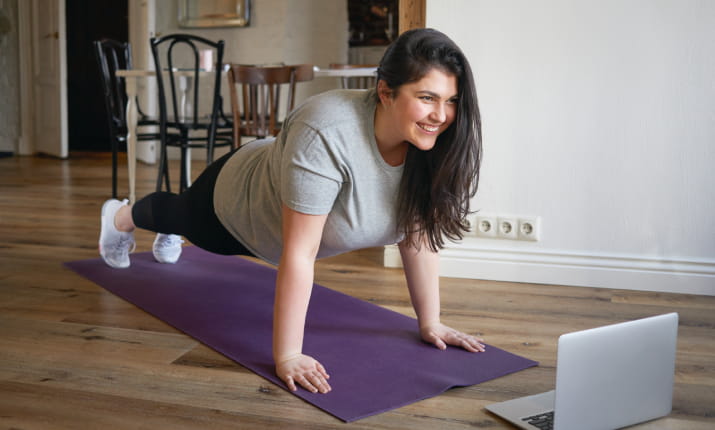The power of a workout: Can exercise boost your grades?
If you’re looking for ways to improve your focus, studying longer and harder might not actually be the answer.

Ever found yourself reading the same sentence over and over but not taking it in? Many students are juggling their online studies with work, family commitments and busy schedules, so it’s not uncommon to experience mental fatigue and low energy levels when it’s time to study—potentially impacting your grades.
Whether it’s low motivation on weekends that’s impacting your studies, brain fog after a long day of work, or studying with your eyes half shut late at night after putting the kids to bed, the secret to improving cognitive function, productivity and academic performance may involve stepping away from your computer and onto an exercise mat.
Understanding the exercise-study connection
Many studies show that exercise can improve your academic performance by helping your brain focus, improving memory, and reducing stress. How so?
- It increases blood flow to the brain: According to Harvard Health Publishing, doing aerobic activity gets more oxygen and nutrients to your brain, which in turn improves brain function and assists in neurogenesis—the process by which new neurons are formed in the brain.
- It stimulates the release of neurotransmitters: Dopamine, noradrenaline and serotonin are released during exercise, which helps with brain cell growth, motivation, stress and focus.
- It improves memory consolidation: Also due to neurotransmitter stimulation, this is the process of transforming short-term memory into long-term memory.
- It strengthens neural connections: This improves brain plasticity, which simply put, is our brain’s ability to alter so we can learn and adapt.
- It promotes better sleep: This indirectly contributes to improved memory, cognitive function and academic performance.
How to leverage your workouts to enhance your academic performance
It only takes 20 minutes. Remember: your goal is to energise, so don’t work out to the point of exhaustion. Try a quick burst of exercise right before opening your books or take an exercise break to reboot your mind.
If you want to improve exam performance, completing a workout beforehand can help you feel calmer, improve recall, and focus for longer periods of time.
Find your exercise-study match
Feeling exhausted?
Reenergise with a power walk or jog outdoors. Combining your aerobic exercise with fresh air helps by sending more oxygen to your brain. In the colder months try opening a window while you ‘drop and give us ten’!
Struggling to memorise your course content?
Get your heart pumping with high intensity interval training (HIIT). According to The National Center for Biotechnology Information, studies suggest that compared to continuous moderate-intensity exercise HIIT can accelerate physiological changes in a shorter period of time and provide more lactic acid supply for the brain—which assists in releasing noradrenaline, a hormone vital for brain function.
The key, however, is to take part in regular exercise. Which can lead to an increase in the hippocampus (the learning and memory part of your brain) size over time.
Late night cramming?
The idea is to sharpen your mind without impacting your quality of sleep. Go for something less vigorous with low impact movements such as planking and squats as not to spike endorphins. Pilates is our recommendation!
Stressed out?
Stretch and flow with yoga or tai chi the morning of an exam. This will wake up your body and mind while calming your nerves and clearing your head. This is achieved by not only improving blood circulation, but through somatic movement and breathing techniques that promote emotional wellbeing and trigger your parasympathetic nervous system i.e. the system that controls your body’s ability to relax.
Unmotivated?
Experience what’s known as a ‘runner’s high’ by pumping up your ‘happy hormones’ (serotonin, dopamine and endorphins) with high intensity aerobic exercise (running or otherwise). It is also said that group fitness stimulates motivation—motivation that you can then apply to your studies. Our tip: Get fired up with some shadow boxing, Rocky style.
Not sure where to begin?
Here are some budget-friendly workout options to guide you, one rep at a time.
Run clubs: These are free and inclusive ways for novice runners to exercise as a group. Look online to see if a neighbourhood near you has one.
Fitness apps: Home workouts have come a long way since the likes of Jane Fonda and the ‘you’ve got a door, you’ve got a gym!’ guy. Check out the app store for endless options—many even have a free trial!
Local gyms: You don’t have to break the bank to join a gym. Did you know there are many gyms that provide student discounts on memberships? Speak to your local fitness club to find out if they do.
YouTube: Subscribe to a fitness channel, or simply search what you’re looking for and follow along on the workout video of your choice. The best part is, it’s completely free. PopSugar Fitness is our top pick for variety!
One last thing: Make sure you always stay hydrated and fuel up with a nutritious smoothie or meal.
Get yourself set up for success
Book a study check-in to ask a student advisor questions about your course, study planning or university admin.



